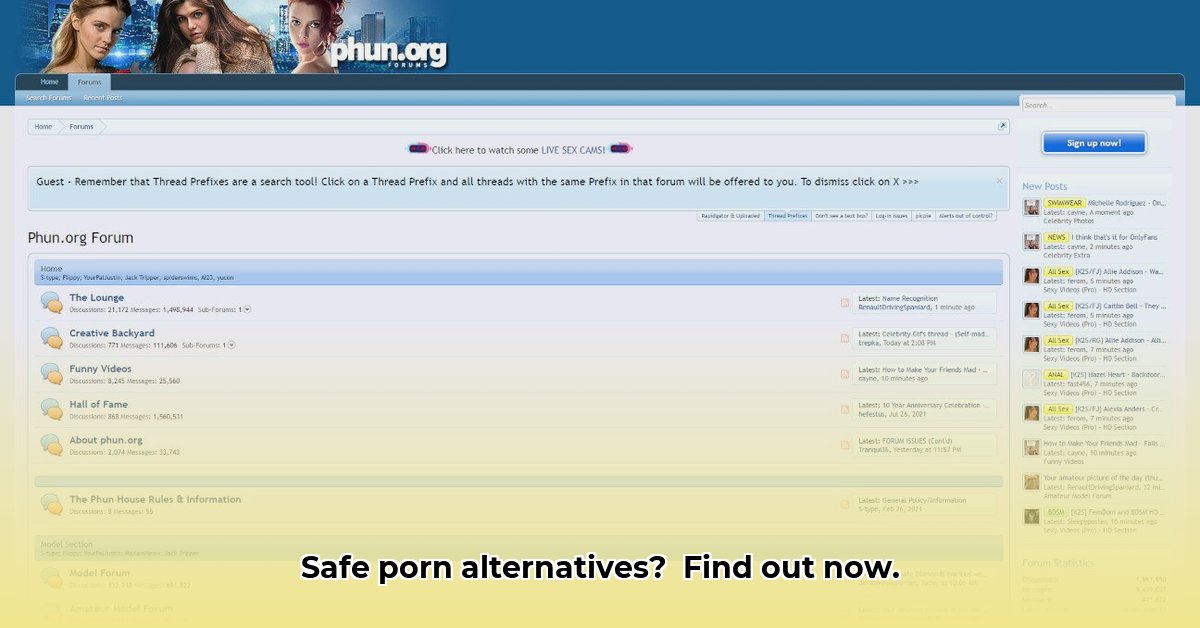
Safer Online Activities: A Guide to Responsible Internet Use
The internet offers a vast landscape of possibilities, but it's crucial to navigate it responsibly. Some online activities, while seemingly harmless, can lead to unforeseen consequences. This article explores healthier alternatives to potentially risky online behaviors, empowering you to make informed choices about your digital wellbeing. For more resources on online safety, visit this helpful site: Online Safety Resources.
Understanding Potential Risks
The internet's vastness also presents risks. Some content can expose users to illegal or harmful material, compromise privacy, or lead to unwanted encounters. Before engaging in any online activity, consider potential downsides. Ask yourself: Could this jeopardize my privacy? Could I be exposed to disturbing content? A cautious approach is vital.
Healthier Alternatives: Fostering Positive Online Experiences
Instead of focusing on potentially harmful online activities, explore these enriching alternatives:
Creative Expression: Unleash your creativity through photography, writing, painting, music, or crafting. These activities offer stress relief, self-discovery, and a sense of accomplishment. They provide a positive outlet for self-expression.
Mindfulness and Meditation: Enhance mental well-being through mindfulness and meditation practices. Numerous apps and resources offer guided sessions, promoting relaxation and stress reduction. Even short daily sessions can make a significant difference in overall well-being.
Physical Activity and Wellness: Improve physical and mental health through regular exercise. Choose activities you enjoy, whether it’s running, swimming, team sports, or simply taking daily walks. Physical activity boosts mood and reduces stress.
Meaningful Social Connections: Nurture relationships with loved ones and build new connections through hobbies or interest-based groups. Strong social bonds combat loneliness and foster a sense of belonging.
Educational Exploration: Expand your knowledge by taking online courses, listening to podcasts, or reading books and articles. Continuous learning stimulates the mind, broadens perspectives, and fosters personal growth.
Practical Steps for Safer Internet Use
Even with safe online choices, responsible practices are key.
Prioritize Reputable Websites: Stick to well-known, trustworthy platforms with positive user reviews and robust safety measures. This minimizes exposure to harmful content and malicious actors.
Utilize Parental Controls (where applicable): Parents should employ parental controls and filtering software to protect children from inappropriate content. This is crucial for ensuring a child’s safety in the digital world.
Safeguard Personal Information: Use strong, unique passwords, avoid sharing sensitive data unnecessarily, and review website/app privacy policies regularly. Protecting your personal information is crucial.
Report Harmful Content: Report illegal or inappropriate content promptly to the platform and relevant authorities. This helps create a safer online environment for all users.
Charting Your Course
Creating a healthier digital life is a personal journey. Reflect on your values, aspirations, and interests. Experiment with different approaches to discover what truly engages you positively and safely. Remember, prioritizing mental and emotional well-being is paramount. The internet offers a wealth of positive experiences – it's up to you to find the ones that resonate with you.
How to Identify and Avoid Online Scams Targeting Adults
Key Takeaways:
- Sophisticated financial scams increasingly target various demographics.
- A multi-pronged approach—combining personal awareness, robust security, and prompt reporting—is crucial.
- Recognizing common scam tactics, like urgency and impersonation, is essential for prevention.
- Reporting scams swiftly helps authorities track and disrupt fraudulent activities.
- Leveraging community resources enhances overall protection.
Financial scams pose a significant threat. These deceptive schemes use various tactics to steal money and peace of mind. Therefore, understanding how to identify and avoid online scams is vital for everyone.
Recognizing Scam Red Flags
Scammers employ deceptive strategies to gain trust, often creating a false sense of urgency. They might impersonate loved ones or institutions, pressuring victims to act quickly before they can rationally assess the situation.
- Suspicious Payment Requests: Be wary of requests for unconventional payments like gift cards or cryptocurrency. Legitimate businesses rarely employ these methods.
- Unsolicited Communication: Ignore unsolicited emails, calls, or texts asking for personal or financial information. Always independently verify the source.
- High-Pressure Tactics: If someone pressures you to act immediately, it is a huge red flag. Legitimate organizations provide time for considered decisions.
- Requests for Personal Data: Never share sensitive information (bank details, social security numbers, passwords) without verifying the requester's legitimacy.
Protecting Yourself: A Multi-Layered Approach
Online security requires a multi-layered approach, akin to a castle with strong defenses.
- Strong Passwords: Create strong, unique passwords for all online accounts.
- Multi-Factor Authentication (MFA): Enable MFA whenever available; it significantly enhances account security.
- Regular Software Updates: Keep software and operating systems updated to protect against vulnerabilities.
- Phishing Awareness: Be extremely cautious of suspicious emails and links; verify authenticity before clicking.
- Financial Institution Reporting: Report suspicious activity immediately to your bank or credit card company.
- Continuous Learning: Stay informed about emerging scam trends through resources like the Federal Trade Commission (FTC) website: https://www.consumer.ftc.gov/
The Broader Perspective: Collective Responsibility
While individual vigilance is important, a collective effort is crucial. Financial institutions must improve fraud detection, technology companies must prioritize user security, and governments need stronger consumer protection laws. A multi-pronged strategy is essential.
Protecting yourself online is an ongoing process. By staying alert and proactive, you can dramatically reduce the risk of becoming a victim of online financial scams.